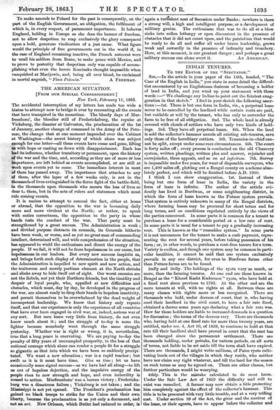THE AMERICAN SITUATION.
FROM OUR SPECIAL CORRESPONDENT.] New York, February 11, 1863. The accidental interruption of my letters has made too wide a hiatus to attempt now to bridge it over by recounting all the events that have transpired in the meantime. The bloody days of Mur- freesboro', the bloodier still of Fredericksburg, the repulse at Vicksburg, the disaster at Galveston, the proclamation of the 1st of January, another change of command in the Army of the Poto- mac, the change that at one moment impended over the Cabinet at Washington—the secret history of which alone was subject enough for one letter—all these events have come and gone, lifting us with hope or casting us down with disappointment. Each has had its influence, whether transitory or permanent, upon the history of the war and the time, and, according as they are of more or less importance, are left behind as events accomplished, or are still at work upon events yet to come. The immediate interest in most of them has passed away. The importance that attaches to any of them, after the lapse of a few weeks only, is not in the thousands of lives extinguished in the fierce fight of the battle-field, in the thousands upon thousands who mourn the loss of lives so dear t, them, but in the acts of rulers and statesmen which must rule coming events.
It is useless to attempt to conceal the fact, either at home or abroad, that the opposition to the war is becoming daily more and more virulent at the North; or rather, to speak with entire correctness, the opposition to the party in whose hands rests the conduct of the war. That party must be strengthened by a great success. The Administration is weak ; and divided purpose distracts its counsels, its Generals hitherto have been weak, or worse, and as yet no great man of commanding intellect, determined will, and wide comprehension of the situation, has appeared to wield the enthusiasm and direct the energy of the people. If we fail, it will not be from hopelessness in our cause, but hopelessness in our leaders. But every new success inspirits us, and brings forth such display of determination in the people, that the Administration is impelled to new spirit and new action, and the traitorous and merely partizan element at the North shrinks and slinks away to hide itself out of sight. Our worst enemies are not the Rebels, nor yet their Northern friends, but the timidity and despair of loyal people, who, appalled at new difficulties and obstacles, which must, day by day, be developed in the progress of the war, are almost ready to drop their hands in hopeless inactivity, and permit themselves to be overwhelmed by the dead weight of incompetent leadership. We know that history only repeats itself, and that our experience is only the experience of all countries that have ever been engaged in civil war, or, indeed, serious war of any sort. But men learn very little from history, do not even know much about it ; and the struggle of to-day is none the lighter because somebody went through the same struggle yesterday. Whether war is right or wrong, it is, nevertheless, true that a long peace is enervating. We are paying to-day the penalty of fifty years of unexampled prosperity, in the loss of that national courage which alone can render a people fit for a struggle so gigantic as that into which we have been so suddenly precipi- tated. We want a new education ; war is a rapid teacher ; but swift as it is it must have time. Give us time ; let us have occasionally some signal success—as we have had all along—to lift us out of hopeless dejection, and the impulsive energy of the people rises to new strength and hope, and even imbecility is roused to action. Murfreesboro' was a barren victory ; Fredericks- burg was a disastrous failure ; Vicksburg is not taken ; and the Mississippi is not yet opened. The President's proclamation has gained no black troops to strike for the Union and their own liberty, because the proclamation is as yet only a document, and not an act. New Orleans, which Butler had reduced to order, ix
again a turbulent nest of Secession under Banks; nowhere is there a strong will, a high and intelligent purpose, or a development of military genius. The enthusiasm that was to do all at a blow sinks into sullen lethargy or open discontent in the presence of obstacles that it did not count upon, and the patriotism that would be ready to do all and suffer all under brave leadership, grows weak and cowardly in the presence of infirmity and treachery. Here, at this moment, is our greatest danger ; and perhaps a great
military success can alone avert it. As AMERICAN.






























 Previous page
Previous page